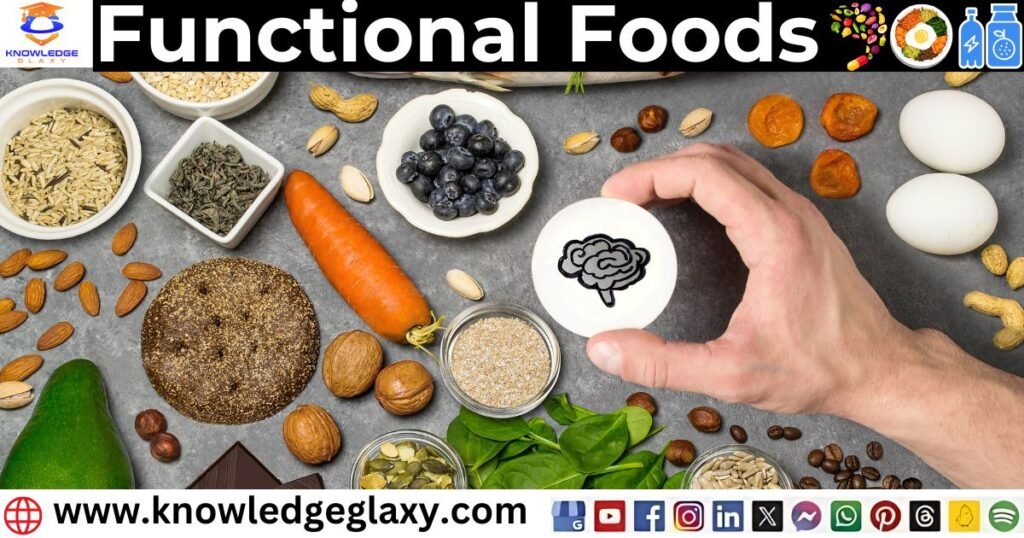In recent years, functional foods have gained significant popularity within health and wellness circles. Also known as nutraceuticals, functional foods are highly nutritious and associated with numerous powerful health benefits. They can protect against disease, prevent nutrient deficiencies, and promote proper growth and development. This article explores the definition, benefits, and potential uses of functional food.
Read More: Stroke Recovery

What are Functional Foods?
Functional food are ingredients that offer health benefits beyond their basic nutritional value. Some types contain supplements or additional ingredients designed to improve health. The concept originated in Japan in the 1980s when government agencies began approving foods with proven benefits to enhance the health of the general population.
Examples include foods fortified with vitamins, minerals, probiotics, or fiber. Nutrient-rich ingredients like fruits, vegetables, nuts, seeds, and grains are also considered functional food. For instance, oats contain a type of fiber called beta glucan, which has been shown to reduce inflammation, enhance immune function, and improve heart health. Similarly, fruits and vegetables are packed with antioxidants, which are beneficial compounds that help protect against disease.
Summary
Functional food are foods that offer health benefits beyond their nutritional value. This category includes nutrient-rich ingredients like fruits and vegetables, as well as foods fortified with vitamins, minerals, probiotics, and fiber.
Examples of Functional Food
Functional food are generally separated into two categories: conventional and modified.
Conventional Foods:
- Fruits: Berries, kiwi, pears, peaches, apples, oranges, bananas
- Vegetables: Broccoli, cauliflower, kale, spinach, zucchini
- Nuts: Almonds, cashews, pistachios, macadamia nuts, Brazil nuts
- Seeds: Chia seeds, flax seeds, hemp seeds, pumpkin seeds
- Legumes: Black beans, chickpeas, navy beans, lentils
- Whole Grains: Oats, barley, buckwheat, brown rice, couscous
- Seafood: Salmon, sardines, anchovies, mackerel, cod
- Fermented Foods: Tempeh, kombucha, kimchi, kefir, sauerkraut
- Herbs and Spices: Turmeric, cinnamon, ginger, cayenne pepper
- Beverages: Coffee, green tea, black tea
Modified Foods:
- Fortified juices
- Fortified dairy products, such as milk and yogurt
- Fortified milk alternatives, such as almond, rice, coconut, and cashew milk
- Fortified grains, such as bread and pasta
- Fortified cereal and granola
- Fortified eggs
Summary
Nutrient-rich foods like fruits, vegetables, and legumes are often considered functional food, along with fortified foods like juice, eggs, and cereal.
Potential Benefits
Functional food are associated with several potential health benefits.
May Prevent Nutrient Deficiencies
Functional foods are typically high in important nutrients, including vitamins, minerals, healthy fats, and fiber. Filling your diet with a variety of functional food — including both conventional and fortified foods — can help ensure you get the nutrients you need and protect against nutrient deficiencies.
For instance, after iron-fortified wheat flour was introduced in Jordan, rates of iron deficiency anemia among children were nearly cut in half. Fortification has also been used to prevent other conditions caused by nutrient deficiencies, including rickets, goiter, and birth defects.
May Protect Against Disease
Functional foods provide important nutrients that can help protect against disease. Many are especially rich in antioxidants, which help neutralize harmful compounds known as free radicals, preventing cell damage and certain chronic conditions, including heart disease, cancer, and diabetes.
Some functional foods are also high in omega-3 fatty acids, which can reduce inflammation, boost brain function, and promote heart health. Others are rich in fiber, which can promote better blood sugar control and protect against conditions like diabetes, obesity, heart disease, and stroke. Fiber may also help prevent digestive disorders, including diverticulitis, stomach ulcers, hemorrhoids, and acid reflux.
May Promote Proper Growth and Development
Certain nutrients are essential to proper growth and development in infants and children. Enjoying a wide range of nutrient-rich functional food as part of a healthy diet can help ensure that nutritional needs are met. For example, cereals, grains, and flours are often fortified with B vitamins like folic acid, which is essential for fetal health. Low levels of folic acid can increase the risk of neural tube defects, which can affect the brain, spinal cord, or spine.
Other nutrients commonly found in functional food also play key roles in growth and development, including omega-3 fatty acids, iron, zinc, calcium, and vitamin B12.
Proposed New Definition of Functional Foods
Based on the arguments presented here, a new definition is needed for functional food. The proposed definition is as follows:
Functional foods are novel foods that have been formulated so that they contain substances or live microorganisms that have a possible health-enhancing or disease-preventing value, and at a concentration that is both safe and sufficiently high to achieve the intended benefit. The added ingredients may include nutrients, dietary fiber, phytochemicals, other substances, or probiotics.
The Institute of Food Technologists presented a similar definition. A key feature of these foods is that they are novel. This therefore excludes foods such as yogurt and refined cereals with added B vitamins.
Foods that Contain Functional Components
Plant foods contain a variety of functional components such as vitamins (C, A, and E), minerals, phenolic compounds, antioxidants, and phytochemicals. These secondary metabolisms produce physiologically active molecules that are helpful for the human body. The various classes of health-promoting substances (phytosterols, carotenoids, phytosterols, phenolic compounds, nondigestible carbohydrates, tocotrienols, and organosulfur compounds) are discussed together with their dietary origins as well as their biological and chemical properties that justify their mechanisms of action.
Plant-based functional food (broccoli and other cruciferous vegetables, fruit, grapes, tomato, soybean, oat, oranges, flaxseed, garlic, wine, and tea) play a functional role in the healthy body, as well as the phytochemicals concerned and benefits of health-promoting function. The study stresses the relevance of eating fruits and vegetables for people’s overall wellbeing, as well as certain science and technological prospects in developing countries.
Phytochemicals found in whole grains, fruits, and vegetables are the most abundant sources of functional components. Conversely, animal products like milk, fermented milk products, and freshwater fish include antioxidants, covalently linked linolenic acid, long-chain omega-3, −6, and − 9 polyunsaturated fatty acids, and organic acids.
Functional Foods Examples
Functional foods are ingredients that offer more than basic nutrition, often containing compounds that support specific health benefits. Examples of functional food include:
- Yogurt: Contains probiotics, which support gut health and the immune system.
- Berries (Blueberries, Strawberries): Rich in antioxidants like anthocyanins that protect cells from damage.
- Fatty Fish (Salmon, Mackerel): High in omega-3 fatty acids, which support heart health and reduce inflammation.
- Fortified Cereals and Juices: Often contain added vitamins like D and calcium for bone health.
- Nuts and Seeds: Rich in fiber, healthy fats, and antioxidants, they support heart health and reduce inflammation.
These examples showcase how functional food can contribute to a balanced diet while addressing specific health needs.
Functional Foods PDF
For those looking to explore Functional Food in PDF format, various resources are available, such as:
- Research articles on the impact of functional foods on public health.
- Studies on nutritional profiles and health benefits of different functional food.
- Educational resources that provide an introduction to functional food and their classifications.
Providing downloadable PDFs for readers on this topic can make it easier to share and study offline.

Functional Foods PPT
A Functional Foods PPT could cover the following points in slides:
- Introduction to Functional Food: Definition, significance, and history.
- Classification: Categories of functional food based on their health benefits.
- Health Benefits: Detailed examples of functional food and their specific health roles.
- Market and Trends: Growth of the functional foods industry and emerging products.
- Case Studies and Research: Recent findings on functional food and their effectiveness.
Such a PPT would help deliver a structured, visual presentation of functional food, ideal for educational or corporate settings.
Functional Food Journal
Journals dedicated to Functional Food often publish research on:
- Nutritional science and new functional food discoveries.
- Clinical trials assessing the health benefits of functional food compounds.
- Food technology and innovation, such as the development of fortified foods.
- Dietary impacts on public health and preventive medicine through functional food.
These journals provide scientific backing and are valuable resources for academic and professional audiences interested in the latest research on functional food.
Functional Foods and Nutraceuticals
While Functional Food provide health benefits beyond basic nutrition, nutraceuticals are products derived from foods that provide medicinal or health benefits. Nutraceuticals are often sold as:
- Supplements: Concentrated forms of beneficial compounds like omega-3 pills.
- Herbal extracts: Such as turmeric or green tea extract for their antioxidant properties.
- Enhanced foods: Such as drinks enriched with added vitamins or minerals.
Both categories emphasize health, but nutraceuticals are often consumed as supplements rather than as part of a regular diet.
Classification of Functional Foods
Functional foods can be classified into several groups:
- Natural Functional Foods: Foods like fruits, vegetables, and grains that naturally contain beneficial compounds.
- Modified Functional Food: Foods enhanced with additional nutrients, such as fortified milk or juice.
- Synthetic Functional Food: Foods created or modified through biotechnology to enhance health benefits.
- Fortified/Enriched Foods: Foods with added nutrients, like cereals fortified with iron.
Each category addresses different health needs and caters to diverse dietary preferences.
4 Categories of Functional Food
Functional foods are often divided into these four categories:
- Conventional Foods: Naturally functional food, like fruits and vegetables.
- Modified Foods: Foods that have been nutritionally enhanced, such as vitamin-enriched juices.
- Medical Foods: Specially formulated foods for health conditions, like nutrient-rich supplements for patients.
- Fortified Foods: Foods with added vitamins and minerals, such as iodine in salt.
These categories help structure the types of functional food available in the market, highlighting their roles in health and wellness.
Examples of Functional Foods and Their Benefits
Each functional food offers unique benefits:
- Green Tea: Contains catechins that may reduce inflammation and promote heart health.
- Garlic: Known for its anti-inflammatory and potential cardiovascular benefits.
- Oats: High in beta-glucan, which supports heart health by reducing cholesterol levels.
- Dark Chocolate: Contains flavonoids that may improve heart health and cognitive function.
Each food type showcases the powerful health-supporting qualities of functional food, promoting their role in preventive health.
Conclusion:
Functional foods are emerging as a central pillar in the promotion of health and wellness. As modern diets evolve, the role of functional food becomes increasingly significant for preventive health, offering natural ways to support and enhance body functions. From boosting immunity with probiotics in yogurt to supporting heart health with omega-3s in fatty fish, these foods are a critical part of a balanced, nutrient-rich diet. By understanding and incorporating these functional food, individuals can take a proactive approach to their health. Functional food exemplify the concept that food can act as a natural form of medicine, fostering overall well-being. As research continues, the accessibility and popularity of functional food will likely expand, encouraging healthier dietary practices across diverse populations.
Read More: Functional Foods
FAQs:
What are functional foods?
Functional foods are foods that offer health benefits beyond basic nutrition. They contain compounds that may improve well-being and prevent certain diseases.
How do functional foods differ from regular foods?
Functional foods contain bioactive compounds, vitamins, minerals, or probiotics that provide specific health benefits, unlike regular foods that primarily offer calories and basic nutrition.
What are examples of common functional foods?
Examples include yogurt, berries, fatty fish, green tea, oats, and dark chocolate, each of which offers specific health benefits like improved gut health or reduced inflammation.
Can functional foods replace medication?
While functional foods provide health benefits, they are not a substitute for medication. They can support health but should be part of a balanced diet alongside medical treatment when needed.
Are all functional foods natural?
No, functional foods can be natural, modified, fortified, or even synthetic. Examples include natural blueberries, fortified cereals, and omega-3 supplements.
What are some benefits of eating functional foods?
Functional foods can support heart health, enhance digestion, boost immunity, and reduce inflammation, among other benefits.
Are functional foods the same as superfoods?
While both provide health benefits, “superfoods” is a marketing term without strict scientific definitions, whereas functional foods are scientifically recognized for their added health benefits.

Do functional foods have any side effects?
Generally, functional foods are safe. However, excessive intake (like too many fortified products) can lead to nutrient imbalances or other health issues.
How can I include more functional foods in my diet?
Add items like berries, nuts, fatty fish, and vegetables to meals. Using fortified products or probiotics like yogurt is also effective.
What is the role of probiotics in functional foods?
Probiotics are live bacteria beneficial for digestive health, often found in functional foods like yogurt and fermented foods, helping balance gut flora.
What is the difference between functional foods and nutraceuticals?
Functional foods are consumed as part of a regular diet, while nutraceuticals are concentrated food extracts or supplements designed for medicinal purposes.
How are functional foods classified?
Functional foods are classified into natural, modified, fortified, and synthetic categories, each offering unique health benefits.
Are there any functional foods for brain health?
Yes, foods like fatty fish, nuts, berries, and dark chocolate have compounds that support brain health and cognitive function.
Can functional foods help with weight management?
Certain functional foods like fiber-rich vegetables, oats, and nuts promote satiety, which can support weight management.
Do functional foods support heart health?
Yes, many functional foods like fatty fish, oats, nuts, and green tea contain compounds that support heart health by reducing cholesterol and inflammation.
What are fortified foods?
Fortified foods have added nutrients that aren’t naturally present, such as vitamin D in milk or calcium in orange juice, making them functional foods.
Is dark chocolate considered a functional food?
Yes, dark chocolate contains flavonoids that support heart health and may improve cognitive function, making it a functional food.
What are synthetic functional foods?
Synthetic functional foods are created or modified through biotechnology to enhance specific health benefits, like omega-3-fortified eggs.
Are functional foods beneficial for the immune system?
Yes, foods like garlic, yogurt with probiotics, and citrus fruits contain compounds that may boost the immune system.
Is there scientific evidence supporting functional foods?
Yes, numerous studies have shown that functional foods, like omega-3 fatty acids for heart health and probiotics for gut health, provide measurable health benefits.






